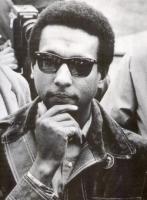

The only ones who were able to stay alive were the ones who never admitted that they committed a crime against people–that is, the ones who rationalized that Jews were not human beings and deserved to be killed, or that they were only following orders. Any prisoner who any of the Nazi prisoners who admitted, after he was caught and incarcerated, that he committed crimes, that he killed all the many people that he killed, he committed suicide. Were he to condemn himself, he would then have to inflict punishment upon himself. We in SNCC tend to agree with Camus and Sartre that a man cannot condemn himself. The black existentialist philosopher who is pragmatic, Frantz Fanon, answered the question. The philosophers Camus and Sartre raise the question whether or not a man can condemn himself.

He says, “All criticism is a autobiography.” Dig yourself. Bernard Shaw two days ago, and I came across a very important quote which I think is most apropos for you. (applause) Oh, for my members and friends of the press, my self-appointed white critics, I was reading Mr. That’s a function of people who are advertisers that call themselves reporters. We wanted to say that this is a student conference, as it should be, held on a campus and that we’re not ever to be caught up in the intellectual masturbation of the question of Black Power. (applause) I just can’t make it, ’cause I wasn’t born in the United States. The first is, that, based on the fact that SNCC, through the articulation of its program by its chairman, has been able to win elections in Georgia, Alabama, Maryland, and by our appearance here will win an election in California, 1968 I’m goin’ to run for President of the United States. (audience laughter) We wanted to do a couple of things before we started. It’s a privilege and an honor to be in the white intellectual ghetto of the West. STOKELY CARMICHAEL, “BLACK POWER” (29 OCTOBER 1966)


 0 kommentar(er)
0 kommentar(er)
